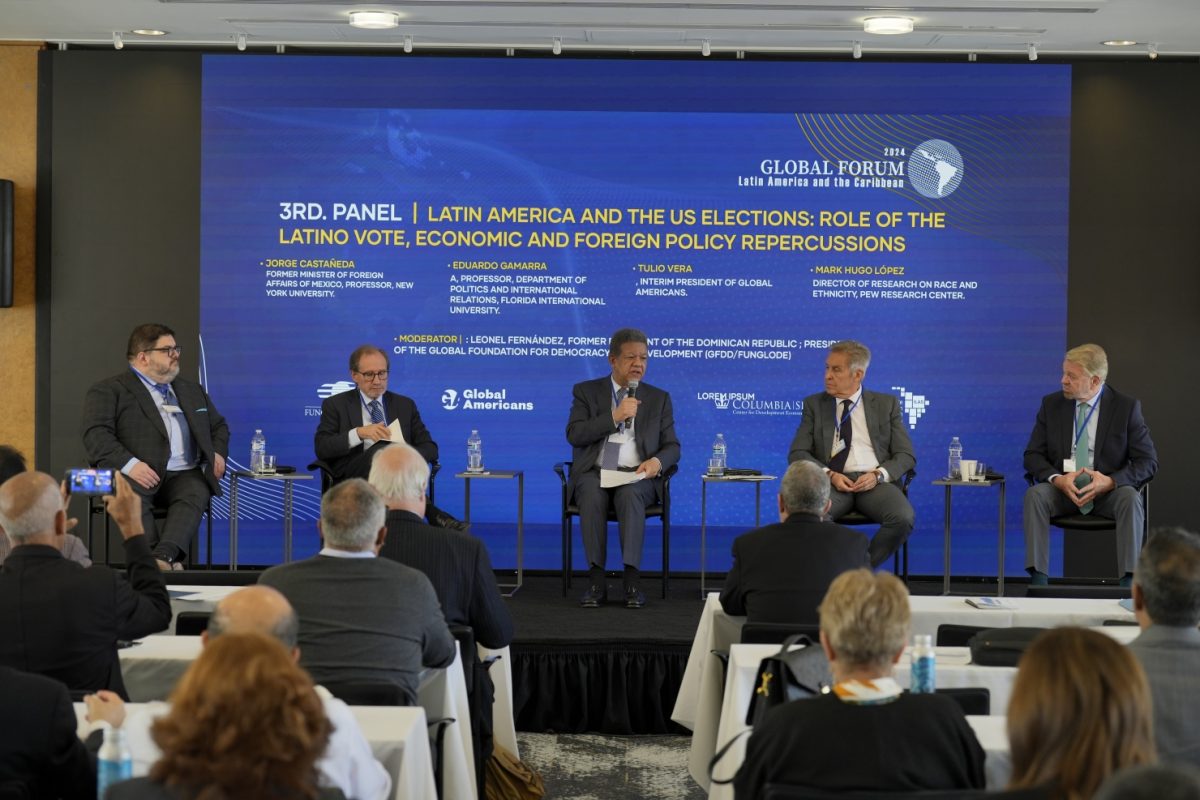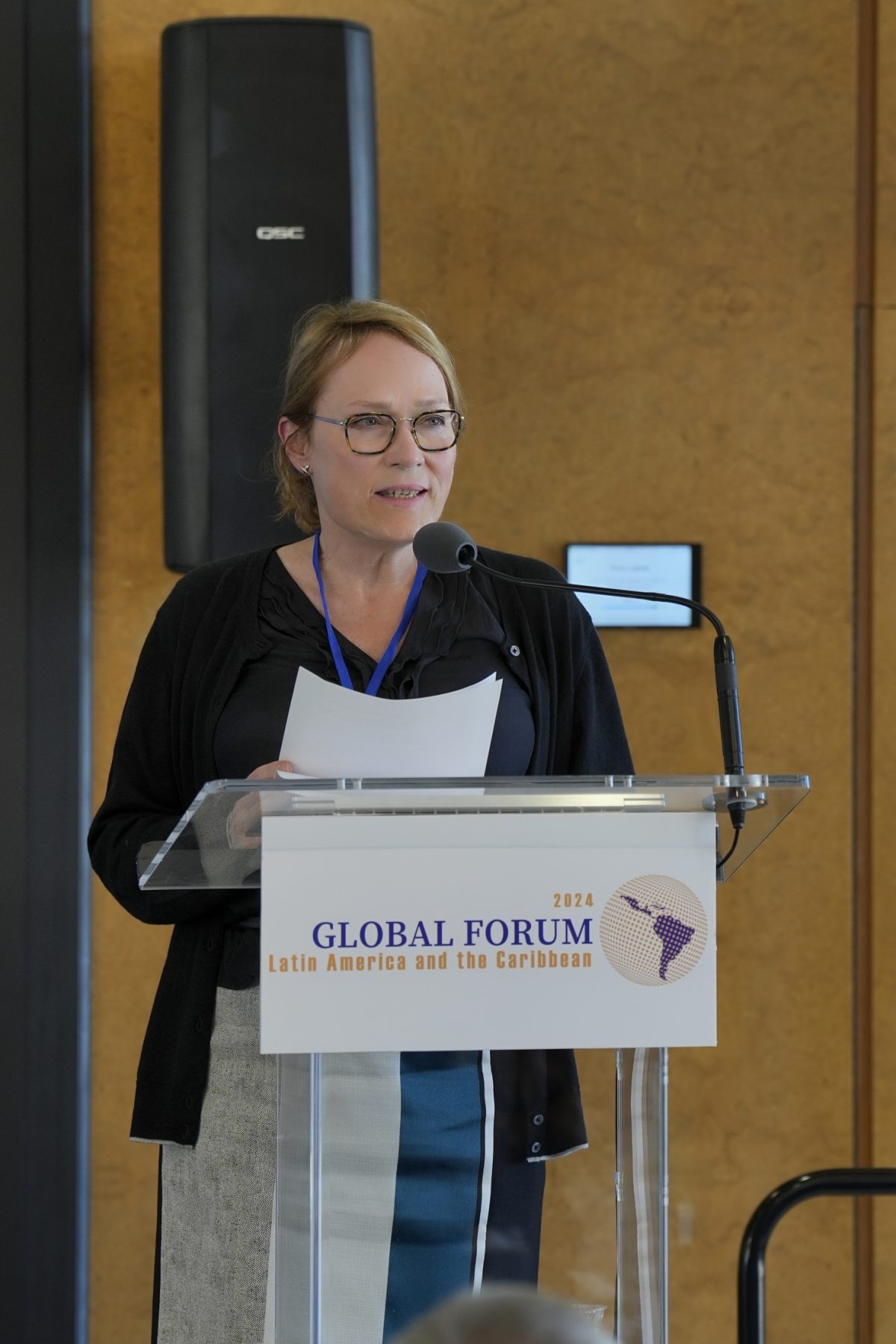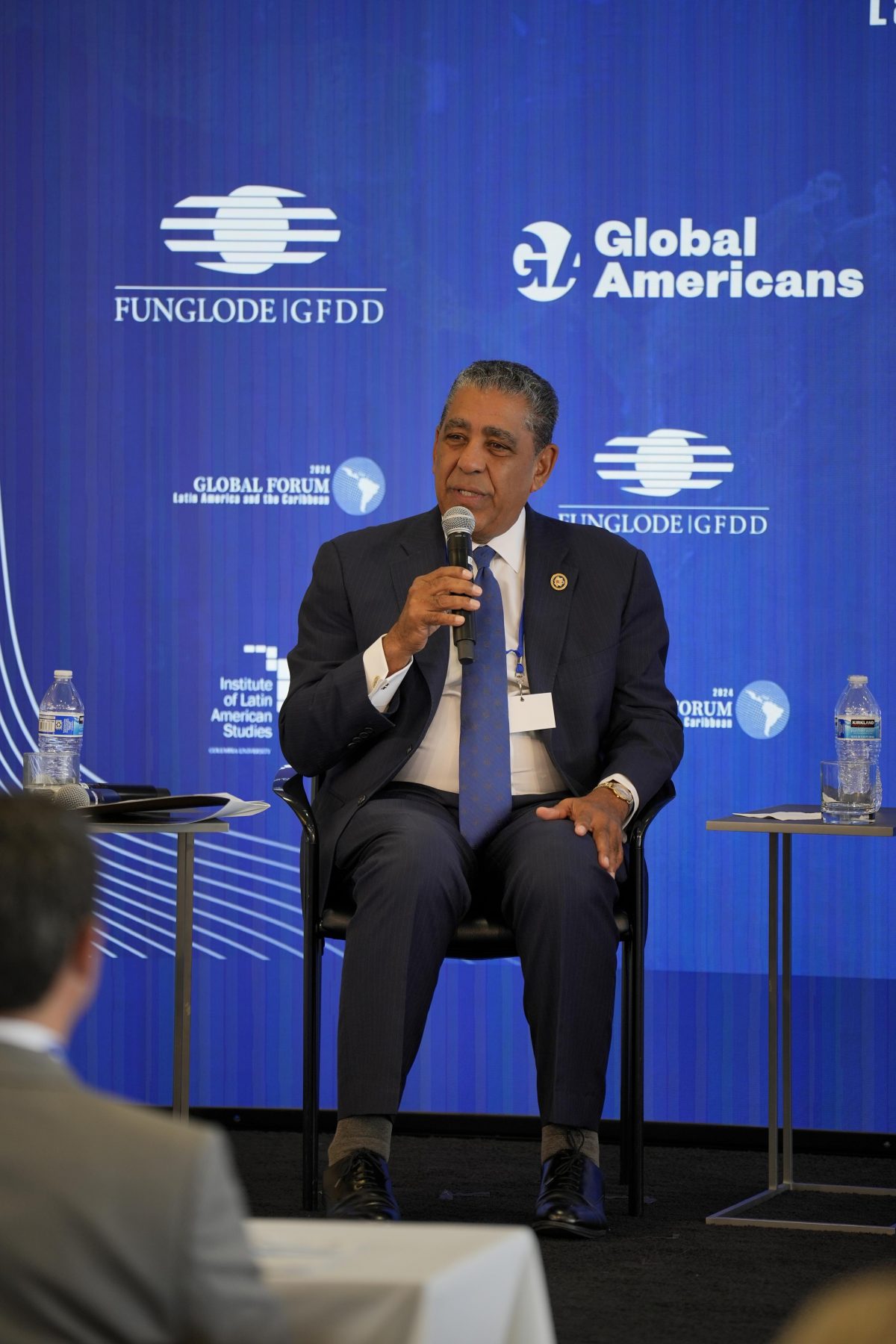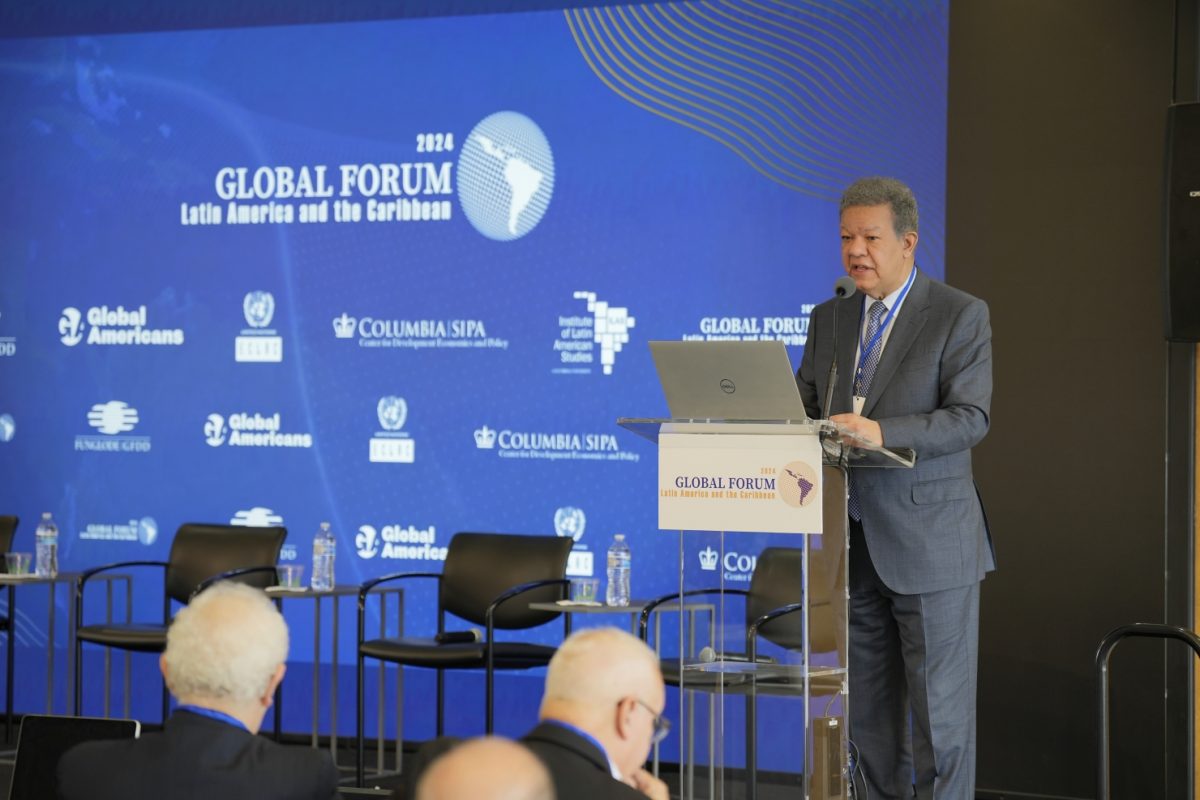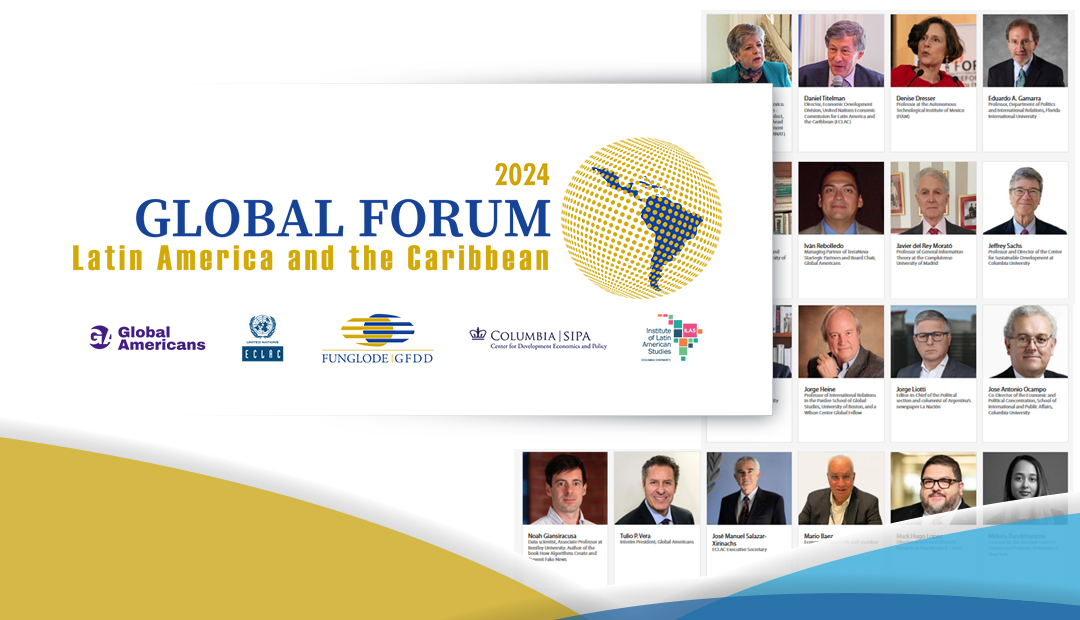The experts who participated in the Panel discussion titled “Current Political and Social Issues in Latin America”, during the Global Forum on Latin America and the Caribbean 2024, referred to the current reality of Venezuela, Nicaragua, Argentina, Mexico and El Salvador, among other countries in the region. The Forum opened on Thursday, October 3, at the Center for Economics and Development Policy of Columbia University’s The Kellogg Center.
NEW YORK. The democratic wave that Latin America experienced decades ago, with growth quotas and respect for human rights, is experiencing tangible setbacks and trends that show a decline in the political achievements that gave the region opportunities to invest in development processes that today appear adrift.
Participants in the panel “Current Political and Social Issues in Latin America,” were Denise Dresser, professor of the Political Science Department of the Autonomous Technological Institute of Mexico; Jorge Liotti, head of the political section of newspaper La Nación; Gerardo Munck, professor of Political Science and International Relations at the University of Southern California (USC), and Will Freeman, Fellow of Latin American Studies, Council on Foreign Relations. The panel was moderated by Iván Rebolledo, managing partner of Terra Nova Strategic Partners and president of the Board of Directors of Global Americans. The panels and speeches of the Forum are available for viewing and downloading at: https://www.youtube.com/watch?v=mnjmEzywfnM
Denise Dresser: In Mexico, Democratic Institutions Have Been Subverted
In Mexico, things were not going well regarding the country’s democracy, and that we were unable to correct before the former president, José Manuel López Obrador, was the result of that dysfunctional democracy, expressed the political scientist.
Even in Adam Przeworski’s definition of what a democracy is, parties that lose elections or a method to process conflicts, Mexico has ceased to have those characteristics. In Professor Dresser’s opinion, “because of the judicial reform, the militarization process, with what is happening within the National Electoral Institute and the erosion of a checks-and-balances system, and the hold of the judicial power,” the country has dismantled the minimum conditions necessary to remain a democracy.
If López Obrador or Claudia Sheinbaum, Mexico’s new president – who came to power with the support of her predecessor and the Morena party – were here, they would confirm that democracy means the will of the people, with the nearly 36 million votes she received, argues Dresser. She warned that today “the fourth transformation is eliminating the conditions under which Mexicans could remove the Morena government if it acted badly.”
She reiterated her statements with the following: “We will no longer have the ability to remove those that are incompetent. Because in order to have a basic electoral competence, you need a minimum of institutional and legal arrangements, a minimum of basic economic and civil rights, a minimum of an independent judiciary and courts that ensure those rights. Victories must be temporary and defeats must be temporary. Today I would argue that Mexico has lost those minimum conditions.”
What we have witnessed – she said – was the arrival of a man, and now a woman, through the democratic route and the electoral vote, but who have come to office and have subverted the country’s democratic institutions. She argued that this is the paradox of our times and that it is happening not only in Mexico. “It is happening in many parts of Latin America and around the world. So, I would end by saying that Mexico, sadly, has a long history of placing its destiny in the hands of omnipotent rulers, while it staggers from crisis to crisis,” she emphasized.
In conclusion, she argued that López Obrador and Claudia Sheinbaum are taking the country down a very familiar path. “And for those of us with historical memory, we know where it leads. Not to a strong, healthy, vibrant democracy as we understand it, which includes checks-and-balances, separation of powers, transparency and accountability, as well as citizen empowerment and basic rights, but rather to an authoritarian, discretionary, lawless form of government, backed by people who should know better.” Jorge Liotti: Javier Milei achieved the presidency at a time of great stress for Argentine democracy.
Jorge Liotti: Javier Milei Became President at a Time When the Argentinian Democracy was Undergoing a Period of Great Stress
Referring to the reality that Argentina is experiencing, with its president Javier Milei, Liotti referred to several contrasting trends: three years ago, he was a panelist, an economist who went through the television channels proposing theories that seemed extremely bold, inapplicable, and that seemed more like the many characters that circulate through streaming and on television. At the end, he became the president of a relevant southern cone nation of the Americas.
He believes that the electoral process that brought Milei to power for the first time clearly exposed a majority perception that there is a structural crisis in Argentina. This means that there was no desire to vote between candidates who were options A or B, and the ordinary classics found in the traditional parties.
He recalled that every two years the Argentine voters had been changing the direction of their vote in a desperate search to find answers to a context that, obviously, in the Latin American framework we see that it was not so out of tune because in the Argentine case it was even more serious.
Argentina has not grown economically, indicating that the last year growth was experienced was in 2011. This means that the country has gone through 13 years of stagnation or economic growth. “And I would state that this perception of structural crisis has three phases, which somehow ended up converging in that important turning point that was 2023.
In his economic analysis he highlighted, among other issues, the impossibility of finding a new economic development matrix for Argentina – which has indicators in terms of GDP per capita – that are similar to the mid-70s, when the import substitution model was exhausted and Argentina, then, failed to find a path of sustainable growth over time.
Regarding some instances of economic improvement in the early 90s and the beginning of the new century, he pointed out that they never constituted a new matrix for economic growth. He also explained the change in its social composition after the crisis of 2001 – 2002, when the economic convertibility system that linked the parity of the dollar with that of the Argentine peso ended.
A system – he said – that was beneficial at the beginning but, in the long run, began to have very high costs in terms of recession processes and unemployment, ending with a social explosion: looting in the streets and the end of the convertibility system. A profound transformation occurred with these events. At the time, the ceiling level for poverty became the floor of poverty, whereby Argentina changed its appearance, going from being a vigorous middle-class nation for most of the 20th century to a nation defined by lower class and lower middle-class sectors.
Liotti pointed out that this was compounded by the political paralysis of the last 15 years, with a polarization between what Peronism represented in its center-left Kirchner version, and what Macrism represented in its center-right version. “Something similar to what the United States began to experience in the post-Trump years, but that in Argentina experienced as a system that became paralyzed because the governments did not have a majority in Congress and that somehow caused the governments to end up mutilating part of their programs, making it impossible for them to progress.”
In his opinion, it was this triple convergence crisis, involving the economic, social, and political sectors that ended up generating a vacuum of possible candidates that Milei ended up filling. This is when the Argentine citizen, “in a moment of great stress for democracy,” ended up exiting through a slope that was not situated in the center of the ideological spectrum but rather in the extreme edges of that path.
“During the first six months of his Administration, Milei bet on what I called the shock of exceptionality, based on the idea that he is an exceptional, different and disruptive character, and that this deep crisis somehow gave him arguments to be able to demand exceptional responses from the political system,” he affirmed. And added: “Thus, for example, he sent what was called at the time an “Omnibus Law,” and its 664 articles to reform the State.
Gerardo Munck:
It is necessary to talk about the erosion of democracy in the region, without losing sight of the positive aspects
In order to evaluate the state of democracy in Latin America, the USC professor preferred to recall, first, the positive wave of transition towards democracy that took place during the eighties and nineties. In addition, he stressed that by the year 2000, the entire region had become democratic, with the exception of Cuba, something that had never happened before in the region’s history.
“If we look at what has happened from 2000 to the present, there have been a whole series of crisis. Some democracies collapsed, followed by the return of democratic governments,” he indicated. He also underlined the two “clear exceptions to these democratic trends:” Venezuela and Nicaragua. Currently – he added – there is a discussion about El Salvador and Mexico.
Elections are the undisputed means of accessing power in democracies, he stated, and highlighted that there is something to be said about many countries that have developed a wealth of democratic practices, sometimes in three or four decades in some cases, but he pointed out that this “was certainly not the case in the 20th century”, which he considers “something new”, with the admission that there are many problems related to democracy.
Currently – he stated as one of his conclusions – “there is a discussion about democratic erosion, a regression process, which I think addresses a very important trend. It is very important to have these discussions.”
Will Freeman: The Rise of Organized Crime in the Region is at the Root of the Democratic Crisis
In his presentation, Freeman expressed his total agreement with what Munck had stated regarding what has happened in the region in the last 10 years, a period in which it entered a new cycle, a new period, after the end of the commodities boom.
For this Latin American studies researcher, one of the main reasons why I believe this has happened is the growth of illegal markets, organized crime and, “if you will, the reorganization of organized crime throughout the region.”
More openly, he stated that “today, organized crime is at the top of the public agenda almost everywhere you look.” Therefore, he considered that it is not a mystery why President Nayib Bukele, in El Salvador, is probably the most talked about leader in the region, when viewed internationally, for having imprisoned almost 2% of the adult male population of his country.
The chaos in Ecuador, which has descended into gang violence and has become a new cocaine export hub, has also been one of the biggest news stories of recent years. Freeman warned. He also added that in the case of Mexico, “of which we heard earlier, has just concluded its most violent elections in recent history, with more than two dozen candidates killed, not to mention the hundreds who resigned from their candidacies under threat from organized crime.”
He also added to the list the case of Brazil, which is holding its local elections on October 6. He pointed out that in the race to govern the largest city in Latin America, and the largest city in the entire Southern Hemisphere, São Paulo, there is a contender, and a very strong one at that: Pablo Marçal, a far-right fitness trainer and influencer, who is a small-party candidate, Pehe de Be, whose president was caught on tape boasting about his ties to the country’s main drug cartel, Pese Se. Although he denied it, **Folha de São Paulo** has verified it with several sources.
Under these circumstances, it is worth asking, “What has changed?” Why does it seem that organized crime is suddenly at the top of the political agenda everywhere? And what political models are taking shape in the region to respond to both this real problem and the widespread public concern that is now evident, with 67% of Mexicans considering crime to be the country’s main problem, 60% of Brazilians saying the same, and the numbers being equally high in countries like Chile, Peru and many others?
On this crucial issue, said Freeman, he is writing a book called *Reorganized Crime*. He said that to understand why the region seems to be in the midst of a boom in organized crime, specifically during the last 10 years, one must ask why the mafias in the region can operate and grow with apparently very little restrictions, when in reality we are talking about a part of the world that has demonstrated remarkable success in recent times, within living memory, in stopping many other threats to stability and democracy? “Among those threats, which I would argue have been largely curbed and put into the memory box of history, are military coups, hyperinflation in most countries (perhaps not in Argentina, perhaps not in Venezuela, but in most), insurgencies, which until a few decades ago were still so common, and the paramilitaries,” he said, noting that mafias have now expanded in the absence of these other threats that were once existential.
Participants
Denise Dresser earned a B.A. in International Relations from the Colegio de México and a PhD in Political Science from Princeton University. She has been a visiting researcher at the Mexico-United States Center at the University of California, San Diego; at the Center for International Studies at the University of Southern California; at the Inter-American Dialogue in Washington D.C.; and a visiting professor at the University of California, Berkeley, and Georgetown University. She is a columnist for Proceso magazine and an editorialist for Reforma newspaper. She also participates in Carmen Aristegui’s Mesa Política and in La Hora de Opinar.
Author of the chapter “The Complex Relationship Between the News Media and the Political System in Argentina: From co-Optation to Polarization”, included in the book “Globalization, Media Policies & Cultural Markets in Latin America,” Palgrave, 2013. He co-authored the Model Curricula for Journalism Education, developed by UNESCO in 2007. Chapter
Journalistic Coverage and Writing: Journalism Specialized in Politics and Government.”
Gerardo Munck is a professor in the Department of Political Science and International Relations at the University of Southern California (USC). His most recent books include “Latin American Sociopolitical Thought: Social and Intellectual Sciences in Changing Times (with Martín Tanaka, 2023);” “Latin American Politics and Society: A Comparative and Historical Analysis (with Juan Pablo Luna; Cambridge, 2022);” “Critical Junctures and Historical Legacies: Perspectives and Methods for Comparative Social Science (edited with David Collier; Rowman and Littlefield, 2022);” and “A Medium-Quality Institutional Trap: Democracy and State Capacity in Latin America (with Sebastián Mazzuca, Cambridge, 2020).” His research focuses on democracy and democratization processes, Latin America, methodology, and the science of social sciences.
Will Freeman is a Latin American Studies Fellow at the Council on Foreign Relations (CFR). His work focuses on the rule of law, corruption, and organized crime in Latin America, as well as U.S.-Latin American relations. His articles have appeared in Foreign Affairs, the New York Times, The Economist, the Journal of Democracy, the Washington Post, and Americas Quarterly, where he writes a monthly column. Prior to joining CFR, Dr. Freeman was a Fulbright-Hays Fellow in Colombia, Peru, and Guatemala, where he investigated efforts by the judiciaries to sanction cases involving large levels of corruption. During his graduate studies, Dr. Freeman also worked with the Western Hemisphere Subcommittee of the Senate Foreign Relations Committee. He holds a PhD and an M.A. in politics from Princeton University, and a B.A. in political science from Tufts University.
The Forum
Organized by the Global Foundation for Democracy and Development (Funglode) and its sister institution in the United States, the Global Foundation for Democracy and Development (GFDD), in coordination with the Center for Development Economics and Policy (CDEP), the forum has the support of the United Nations Economic Commission for Latin America and the Caribbean (ECLAC), the Institute of Latin American Studies at Columbia University (ILAS) and the think-tank Global Americans (GA).

